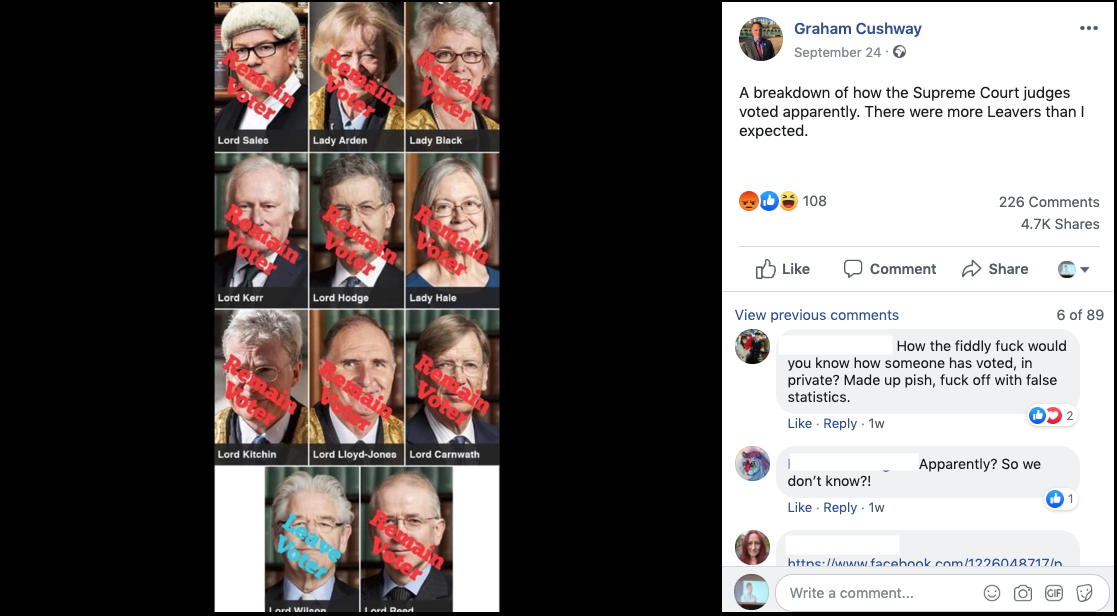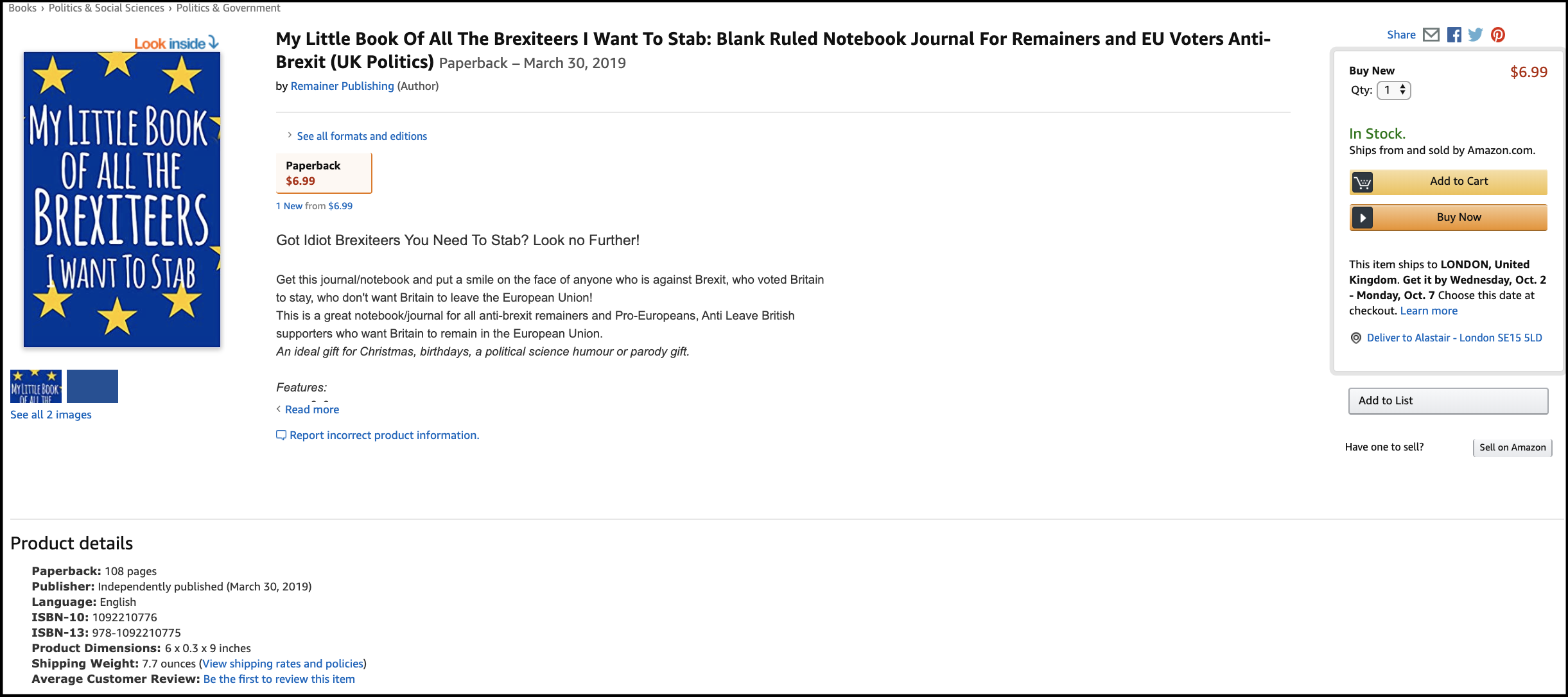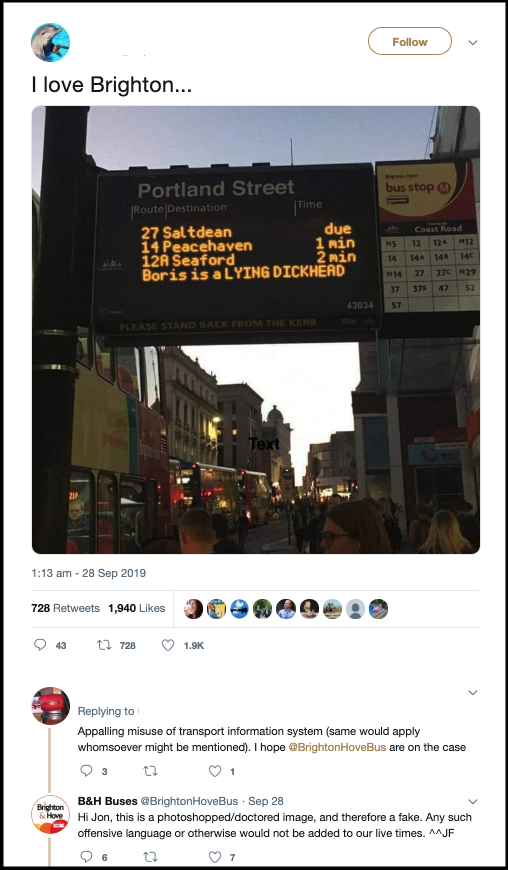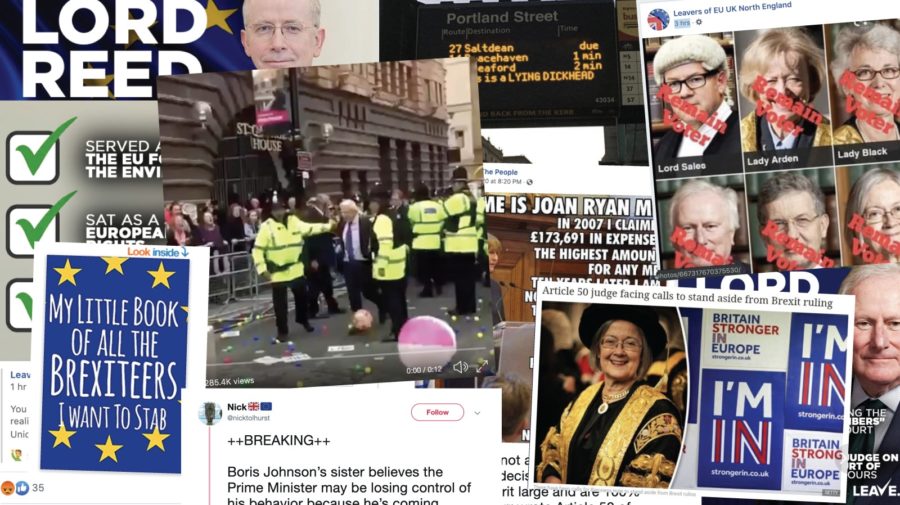Anyone with a working internet connection would have seen the cloud of political uncertainty and divisive vitriol building over the UK in recent months. Misleading tweets, dodgy maths, deceptively-framed narratives and outright lies have seeped into the groundwater of social media, poisoning public discourse as Britain continues to navigate a path out of the European Union.
Some ten days ago, First Draft began officially monitoring and investigating examples of such mis- and disinformation. Here are some of the clearest examples we’ve found so far.
Attacking the media
BBC political editor Laura Kuenssberg had been under fire for the manner in which she reported on a tricky moment for Boris Johnson when a tweet, captioned “I want someone to look at me the way Laura Kuenssberg looks at Boris when he gives a speech”, went viral.
I want someone to look at me the way Laura Kuenssberg looks at Boris when he gives a speech. pic.twitter.com/Irwgzs0mjS
— Joshua Funnell ? (@JoshuaFunnell2) September 19, 2019
The clip saw Mr Johnson talking in a London street as Kuenssberg and ITV political editor Robert Peston smiled and laughed. The tweet has since received nearly 15,000 public interactions, with many believing the clip to be current, but the video is more than three years old, going back to when Johnson was London mayor. A classic case of missing context and, possibly, misunderstanding: “Laughing along or laughing at?” quipped one commenter.
Unexplained billions
On Monday September 23, as the Labour Party enjoyed its annual conference in Brighton, the Conservative Party issued a video which claimed Labour is planning a “free-for-all benefits handout” at a cost of £520 billion per year. Despite multiple phone calls to the press office of both the Labour and Conservative parties, no one has been able to supply evidence as to how the £520 billion figure was reached.
The Supreme Court
The following day, the British Supreme Court ruled that Johnson’s decision to suspend parliament was unlawful. Within 30 minutes the Facebook Page for Leave.EU was posting memes about some of the previous work of the judges, implying their decision was based on whether they identified as a leave or remain voter, rather than their professional abilities. The images have now been shared tens of thousands of times and the New Statesman reported on the narrative framing based on the early identification on CrossCheck.
Another meme that was shared widely after the Supreme Court judgement alleged – without evidence – that all the judges but one had voted remain. First Draft can find no evidence of the judges’ voting record. The earliest version of the meme we found came from a Brexit Party politician who told us he saw it on Twitter. We are still tracking down the original source.

The post from Brexit Party PPC has been shared nearly 5,000 times, although there is no evidence to support the claim. Screenshot by author.
Conservative MEP David Bannerman accused the judges of being “100% Remain” in a tweet that has had nearly 10,000 likes and retweets. He even goes so far as to say one judge, Lord Kerr, wrote Article 50, the legislative mechanism by which the UK is attempting to leave the EU. It was, however, the wrong Lord Kerr. Lord John Kerr wrote Article 50, Lord Brian Kerr sits on the Supreme Court.
‘Disaster capitalism’?
Speculation has been swirling since mid-September that financiers who helped fund Boris Johnson’s leadership bid are now set to make large sums of money by betting that shares in UK companies will fall in the event of a no-deal Brexit. A widely-shared and widely-discredited article by an independent publisher forms the centre of this ‘disaster capitalism’ narrative.
Despite stories from Full Fact, Forbes and the Financial Times which identify numerous holes in the original article, the line has been echoed by Johnson’s sister Rachel, former Chancellor Phillip Hammond, and the grassroots Labour movement Momentum. True, some people made a lot of money from the 2016 referendum, including Jacob Rees-Mogg, now a cabinet minister, and Crispin Odey, who went on to donate to Boris Johnson. But no credible evidence has emerged to show that Johnson is intent on a no-deal Brexit to satisfy the market positions of his financiers.
Problematic publishing
In an increasingly bizarre political climate, there is still space for surprises. During a week of heated debate about the language politicians use and its real-world impact, a tweet from Brexit campaign group Leave.EU highlighted a listing on Amazon for a notebook called “My Little Book Of All The Brexiteers I Want To Stab”. Outrage ensued from from pro-Brexit politicians, social media and the tabloid press, but a little digging cast the book in a mysterious light.

The book by ‘Remainer Publishing’ was self-published on Amazon, making its true origin almost impossible to trace. Screenshot by author.
The Amazon vendor was named “Remainer Publishing”. No such company exists. Stranger still, there was no record of the notebook’s ISBN number at the British ISBN agency Nielsen, nor the International ISBN Agency. The same was true for the other notebooks ‘sold’ by Remainer Publishing, all of which were titled “Bollocks to Brexit”.
First Draft eventually found a match at Bowker, which indexes ISBN numbers in the US. The number was linked to an address for a self-publishing business in South Carolina, the same address assigned to any ISBN number generated when someone tries to self publish on Amazon, including vendors from the UK. And that’s where the trail ran cold.
The offending notebook has since been removed by Amazon but “Remainer Publishing”, er, remains.
Brighton speaks
Tens of thousands of people across Twitter and Facebook shared a doctored image of an electronic bus stop in Brighton which listed the buses due to arrive and the phrase “Boris is a LYING DICKHEAD”. Brighton & Hove Buses declared the image to be fake but would not be drawn on the veracity of its message.

Brighton and Hove Buses said the image of a bus stop with an offensive message about the Prime Minister had been “doctored”. Screenshot by author.
Balls to Boris
A Twitter user with more than 100,000 followers repurposed a four year-old clip of protesters pelting Boris Johnson with coloured balls as the Conservative Party Conference began on Saturday. As is often the case online, many thousands of people re-shared the clip and believed it to be current. The tweet was eventually deleted after high-profile Twitter users pointed out the truth.
The EU Economy
Thousands of people across Twitter and Facebook shared an article on a hyperpartisan website which misquotes a recent report from the European Commission to declare the “EU Economy ‘Weakest It’s Been In Over A Decade’ And Ready To COLLAPSE, New Data Reveals”. The quote in the headline does not exist in the story and the premise of the article appears to balance on a misreading of a recent report into Business and Consumer Survey Results. The author is a former Ukip official and contributor to Tommy Robinson website TR News.
A ‘Brexit dividend’
Finally, the Brexit Party is continuing to trumpet its pledge to invest a “£200bn Brexit dividend for Britain’s regions” in social media posts shared on Wednesday. Party leader Nigel Farage first announced the £200bn figure in June. At the time, the Daily Express report “most of the money will come from the £39billion saved from cancelling the deal with the EU, scrapping the £14billion foreign aid budget and cancelling the HS2 project which is thought to be costing over £100billion.”
The party has not explained how the foreign aid budget and HS2 are linked to Brexit, but the reported figures are some £47 billion short of the pledged amount. Transport Secretary Grant Shapps recently estimated the cost of HS2 to be £88billion, taking the estimated total down to £141 billion. Just the £59 billion left to find then.
First Draft will continue to help newsrooms identify, verify and responsibly report on disinformation as the UK approaches the October 31 Brexit deadline and potential general election. No doubt this is just the beginning.
Interested in becoming a CrossCheck partner? Get in touch.
Stay up to date with First Draft’s work by becoming a subscriber and follow us on Facebook and Twitter.






